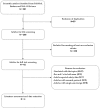The efficacy and safety of adding bevacizumab to cetuximab- or panitumumab-based therapy in the treatment of patients with metastatic colorectal cancer (mCRC): a meta-analysis from randomized control trials
- PMID: 25785004
- PMCID: PMC4358459
The efficacy and safety of adding bevacizumab to cetuximab- or panitumumab-based therapy in the treatment of patients with metastatic colorectal cancer (mCRC): a meta-analysis from randomized control trials
Abstract
Objective: To estimate the efficacy and safety of adding bevacizumab to cetuximab- or panitumumab-based therapy in the treatment of patients with metastatic colorectal cancer (mCRC), using a meta-analysis of randomized controlled trials.
Methods: A literature search for randomized clinical trials (RCTs) was performed through Pubmed, Embase, and Web of Science (up to May 22, 2014). The outcome measures were progression-free survival (PFS), overall survival (OS), objective response rate (ORR), and adverse events. Two investigators identified eligible studies and extracted data independently. The quality of the included studies was assessed by the Jadad score. Hazard ratios (HR), risk ratio (RR), and 95% confidence intervals (Cls) were calculated and pooled.
Results: A total of 4 RCTs with 2069 patients were included in this meta-analysis. The addition of bevacizumab to cetuximab- or panitumumab-based therapy did not significantly prolonged PFS, when compared with antibody alone. The subgroup analysis of adding bevacizumab to cetuximab-based therapy also suggested no significant benefit in PFS or in OS. Patients who received the combined therapy did not have a higher ORR (RR = 0.98, 95% CI: 0.89-1.07; P = 0.608). The incidence of grade 3/4 adverse events was not significantly higher in the bevacizumab and cetuximab/panitumumab group.
Conclusion: The addition of bevacizumab to cetuximab- or panitumumab-based therapy did not improve PFS and OS resulting in better ORR. Thus, the combined therapy of bevacizumab with cetuximab or panitumumab is not recommended for the treatment of mCRC. However, larger scale RCTs are needed to confirm these findings.
Keywords: EGFR; Olorectal cancer; VEGF; bevacizumab; cetuximab; meta-analysis; panitumumab.
Figures





Similar articles
-
The efficacy and safety of panitumumab in the treatment of patients with metastatic colorectal cancer: a meta-analysis from five randomized controlled trials.Drug Des Devel Ther. 2015 Aug 7;9:4471-8. doi: 10.2147/DDDT.S85178. eCollection 2015. Drug Des Devel Ther. 2015. PMID: 26300630 Free PMC article.
-
Efficacy and toxicity of adding cetuximab to chemotherapy in the treatment of metastatic colorectal cancer: a meta-analysis from 12 randomized controlled trials.Tumour Biol. 2014 Dec;35(12):11741-50. doi: 10.1007/s13277-014-2227-z. Epub 2014 Nov 23. Tumour Biol. 2014. PMID: 25417200
-
A comparison of panitumumab and cetuximab in the treatment of KRAS wild-type metastatic colorectal cancer: a systematic review and meta-analysis.Immunopharmacol Immunotoxicol. 2023 Feb;45(1):1-9. doi: 10.1080/08923973.2022.2112222. Epub 2022 Aug 18. Immunopharmacol Immunotoxicol. 2023. PMID: 35950851
-
KRAS Testing for Anti-EGFR Therapy in Advanced Colorectal Cancer: An Evidence-Based and Economic Analysis.Ont Health Technol Assess Ser. 2010;10(25):1-49. Epub 2010 Dec 1. Ont Health Technol Assess Ser. 2010. PMID: 23074403 Free PMC article.
-
FOLFOX plus anti-epidermal growth factor receptor (EGFR) monoclonal antibody (mAb) is an effective first-line treatment for patients with RAS-wild left-sided metastatic colorectal cancer: A meta-analysis.Medicine (Baltimore). 2018 Mar;97(10):e0097. doi: 10.1097/MD.0000000000010097. Medicine (Baltimore). 2018. PMID: 29517682 Free PMC article. Review.
Cited by
-
Clinical Perspectives on Targeting Therapies for Personalized Medicine.Adv Protein Chem Struct Biol. 2016;102:79-114. doi: 10.1016/bs.apcsb.2015.11.003. Epub 2015 Dec 29. Adv Protein Chem Struct Biol. 2016. PMID: 26827603 Free PMC article. Review.
-
Comparative Effectiveness and Safety of Monoclonal Antibodies (Bevacizumab, Cetuximab, and Panitumumab) in Combination with Chemotherapy for Metastatic Colorectal Cancer: A Systematic Review and Meta-Analysis.BioDrugs. 2018 Dec;32(6):585-606. doi: 10.1007/s40259-018-0322-1. BioDrugs. 2018. PMID: 30499082 Free PMC article.
-
Video-assisted thoracoscopic surgery versus open resection of lung metastases from colorectal cancer.Int J Clin Exp Med. 2015 Aug 15;8(8):13571-7. eCollection 2015. Int J Clin Exp Med. 2015. PMID: 26550296 Free PMC article.
-
Exposure-response relationship of ramucirumab in patients with advanced second-line colorectal cancer: exploratory analysis of the RAISE trial.Cancer Chemother Pharmacol. 2017 Sep;80(3):599-608. doi: 10.1007/s00280-017-3380-z. Epub 2017 Jul 25. Cancer Chemother Pharmacol. 2017. PMID: 28744667 Free PMC article.
References
-
- Weitz J, Koch M, Debus J, Hohler T, Galle PR, Buchler MW. Colorectal cancer. Lancet. 2005;365:153–165. - PubMed
-
- Labianca RF, Beretta GD, Pessi MA. Colorectal cancer: diseasemanagement considerations. Drugs. 2001;61:1751–1764. - PubMed
-
- Labianca R, Pessi MA, Zamparelli G. Treatment of colorectal cancer: current guidelines and future prospects for drug therapy. Drugs. 1997;53:593–607. - PubMed
-
- Midgley R, Kerr D. Colorectal cancer. Lancet. 1999;353:391–399. - PubMed
LinkOut - more resources
Full Text Sources
Research Materials
Miscellaneous
